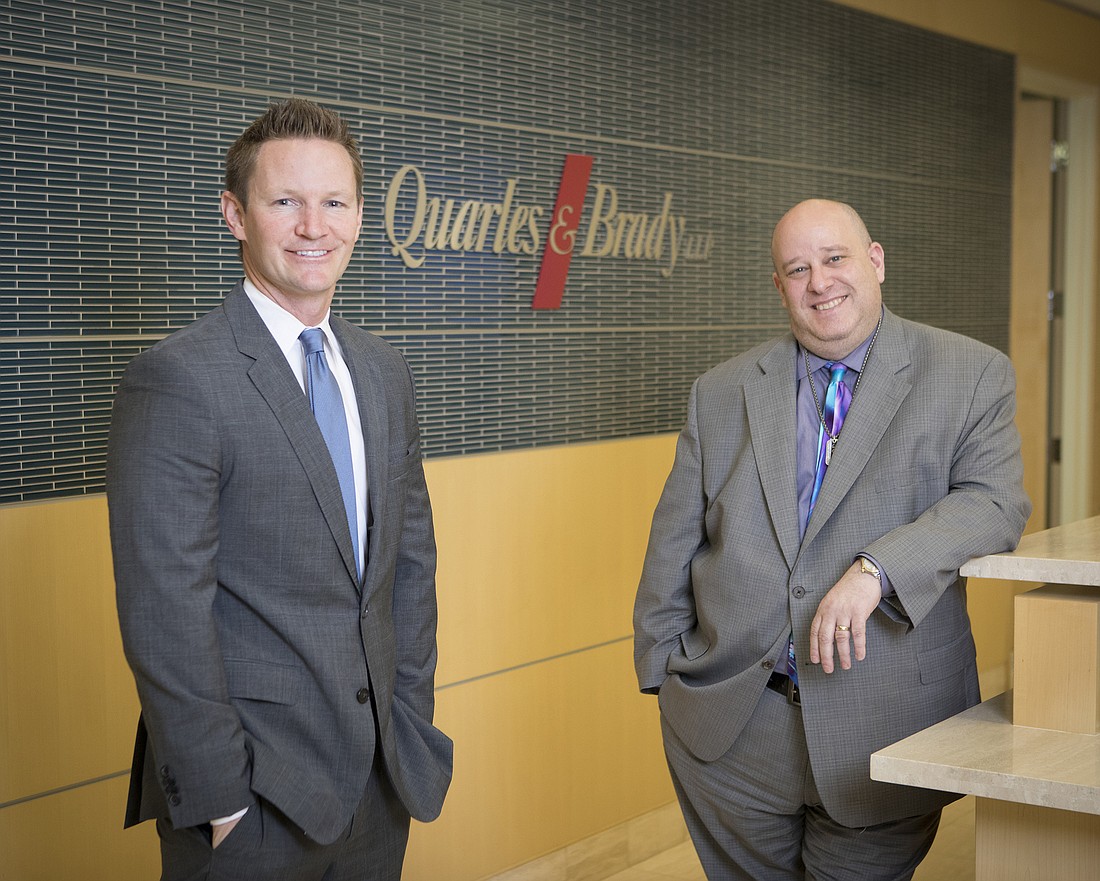- December 15, 2025
-
-
Loading

Loading

It’s been a decade since the arrest of Bernie Madoff, the financier who perpetrated one of the most infamous and longest-running Ponzi scheme in history, defrauding investors of close to $18 billion.
After Madoff’s arrest in December 2008, lawyer Mark Kornfeld joined the Madoff Recovery Initiative's settlement committee and filed about 1,000 lawsuits related to the Madoff scheme, while his team helped recover more than $13 billion. He’s also one of just a handful of lawyers to have interviewed Madoff in federal prison, where the 81-year-old disgraced charlatan is serving a 150-year sentence.
Now Kornfeld is with Tampa-based Quarles & Brady LLP, where he and his new colleague, commercial litigator Jordan Maglich — who founded and runs Ponzitracker, an award-winning business law blog — have created something of an anti-Ponzi scheme knowledge base practice.
It's a strategic move by the national full-service firm, with 20 attorneys in Tampa and 20 in Naples, given how Florida’s appetite for deregulation and sizable population of retirees with money to invest makes the state a hotbed for securities fraud. Also, having Ponzi-scheme busters like Kornfeld and Maglich on staff helps the firm stand out from the crowd. The latter’s blog, ponzitracker.com, includes a national database of hundreds of Ponzi schemes involving more than 1,000 investors that have collapsed over the past 10 years. “And that’s just schemes involving more than $1 million,” Maglich says.
Kevin Delorey, who chairs Quarles & Brady’s national real estate practice group, says commercial litigation and dispute resolution has been a growing area for the firm, but it also prides itself on being a one-stop shop for companies that need legal services as opposed to taking a specialized approach. For that reason, the firm offers alternative fee arrangements — like capped fees, fixed fees and retainers — to ensure its services are affordable when businesses need them most.
“We don’t just spin the meter and charge by the hour,” Delorey says. “We try to [bill] in the most cost-efficient way possible. We’re wide open to that.”
On the potential for more widespread Ponzi schemes, meanwhile, Kornfeld fears investor confidence spurred by the long economic expansion has created an environment ripe for Madoff imitators to ply their trade. That's why he urges financial professionals and individual investors to fully vet any and all opportunities.
'The economy is a lagging indicator. In a good market, fraud is easily hidden.' Jordan Maglich, Quarles & Brady, Tampa
“You have to understand if a strategy is going to work in certain markets,” he says, “both good and bad.”
Maglich adds that the severity with which the federal government treated Madoff has not had the anticipated “chilling effect” on investment fraud.
“Based on the numbers I’m seeing, we’re at a five-year low for Ponzi schemes,” Maglich says. “But the economy is a lagging indicator. In a good market, fraud is easily hidden.”
In the Madoff case, early investors in the decades-long scheme actually made money, and Madoff himself enjoyed a good reputation on Wall Street, having served as NASDAQ chairman. But "he hadn't legitimately invested their money in securities,” Kornfeld says of the origins of Madoff’s ruse. Citing big financial scandals of the 1980s, '90s and early 2000s, Kornfeld says Madoff “was hiding in plain sight … there was lots of other stuff going on that allowed him to operate under the radar.”
The downfall of Wall Street icons Bear Stearns, Lehman Brothers and AIG, coupled with the housing market downturn, created a perfect storm of panic among investors, and Madoff’s great lie was exposed. But Kornfeld says the deception was evident all along, if one made the effort to look.
It didn’t help that the early 2000s, under the administration of President George W. Bush, was an era of financial deregulation, with what Kornfeld says was an under-resourced Securities and Exchange Commission and a financial industry that sometimes failed to perform high-level due diligence. (Several documented cases of potential whistleblowers on Madoff, after the disclosure, for example, were discovered.) Kornfeld and Maglich fear a return to such conditions under the Trump administration, which has sought to dismantle the 2010 Dodd-Frank banking reform law.
“In an environment where deregulation is emphasized," Kornfeld says, "it’s a lot easier for fraud to hide and thrive."
(This story has been updated to reflect how Madoff legitimately invested in securities that made money for investors, and to clarify Madoff's scheme was enabled by an under-resourced SEC. It has also been updated to correct the amount of funds that the Madoff Recovery Initiative helped return to defrauded investors.)